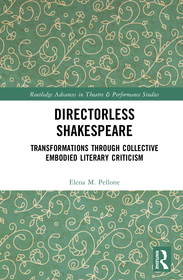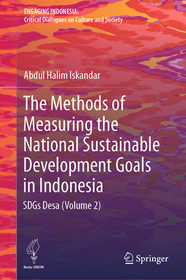
Directorless Shakespeare
Transformations through collective Embodied Literary Criticism
Series: Routledge Advances in Theatre & Performance Studies;
- Publisher's listprice GBP 145.00
-
69 273 Ft (65 975 Ft + 5% VAT)
The price is estimated because at the time of ordering we do not know what conversion rates will apply to HUF / product currency when the book arrives. In case HUF is weaker, the price increases slightly, in case HUF is stronger, the price goes lower slightly.
- Discount 10% (cc. 6 927 Ft off)
- Discounted price 62 346 Ft (59 378 Ft + 5% VAT)
Subcribe now and take benefit of a favourable price.
Subscribe
69 273 Ft

Availability
Not yet published.
Why don't you give exact delivery time?
Delivery time is estimated on our previous experiences. We give estimations only, because we order from outside Hungary, and the delivery time mainly depends on how quickly the publisher supplies the book. Faster or slower deliveries both happen, but we do our best to supply as quickly as possible.
Product details:
- Edition number 1
- Publisher Routledge
- Date of Publication 31 December 2025
- ISBN 9781032771885
- Binding Hardback
- No. of pages246 pages
- Size 234x156 mm
- Language English
- Illustrations 21 Illustrations, black & white; 21 Halftones, black & white 700
Categories
Short description:
Challenging received scholarship on the practice of Shakespeare’s theatre, this book displaces a contemporary cultural bias towards leadership models to reconsider possibilities of working in a non-hierarchical and inclusive creative theatrical practice.
MoreLong description:
Challenging received scholarship on the practice of Shakespeare’s theatre, this book displaces a contemporary cultural bias towards leadership models to reconsider possibilities of working in a non-hierarchical and inclusive creative theatrical practice. It offers ways of restoring to actors a sense of what the Existentialists termed “autonomy” that Shakespeare’s company would have embodied. Against a critical account of two major Shakespeare playhouses – Shakespeare’s Globe, London and the American Shakespeare Center – the book describes the original practice-based research by Anərkē Shakespeare and V.enice S.hakespeare C.ompany without a controlling director. Their staging of three directorless Shakespeare plays, and his narrative poem The Rape of Lucrece, with diverse actors, performance spaces, languages and countries, explores multilingual, intersectional, cross-disciplinary and international possibilities of early modern performance and study. Directorless Shakespeare as “Embodied Literary Criticism” releases the dialogical forces of Shakespeare’s texts, which are more fully served by the centrifugal force of the collective ensemble rather than the centripetal force of the single director. It allows texts to speak fully and multiply, in democratic exchange with an audience, liberated from directorial or theoretically driven concepts.
Directorless Shakespeare will be of great interest to students and scholars in theatre and performance studies, professional practitioners, and historians.
“Starting from a radical reconsideration of our assumptions about how theatre operated in Shakespeare’s own time, Elena Pellone develops a fresh and invigorating conception of how classical drama can be created in our own century. Her monograph not only documents the key artistic staging-posts of the project, but meticulously describes its intellectual foundations. It is a book that should be read by all theatre makers today, and will remain a seminal text for theatre historians of the future.”
Dr Martin Wiggins, Honorary Fellow, The Shakespeare Institute, University of Birmingham, UK
“Pellone's ‘directorless’ versions of Richard II and Macbeth were among the most thorough, nuanced and compelling theatrical performances I have seen of either play. This account of her rationale and methodology deserves to be widely read and widely influential.”
Professor Michael Dobson, Director of The Shakespeare Institute, University of Birmingham, UK
“A pioneering and important book, providing the keys to a directorless theatrical revolution which can empower actors, challenge critical mainstays, and augment equality and inclusivity within the industry. Elena Pellone’s contribution to the field will change the way we view directing and performance forever. Impressive, decisive and inspirational. I cannot recommend it enough to all lovers of Shakespeare, theatre, and the craft of acting.”
Dr Chris Laoutaris, The Shakespeare Institute, University of Birmingham, UK, and author of Shakespeare’s Book: The Intertwined Lives Behind the First Folio
MoreTable of Contents:
Introduction
The Prologue. Opening the curtain: Expressing hidden backgrounds
Chapter 1
Act 1, Scene 1. The Globe: Redistributing power, smashing the mirror up to nature
Chapter 2
Act 1, Scene 2. “We do it with the lights on”: Actors’ Renaissance Season at the Blackfriars Playhouse
Chapter 3
Act 2, Scene 1. Anərkē Shakespeare’s Richard II: Devolved authority and decolonising theatrical practice
Act 2, Scene 2. Vagabonds and Roving Players: Directorless Richard II in Würzburg, Germany, Essex’s command performance and Stanislavski the unwelcome guest
Act 2, Scene 3. “Thus play I in one person many people”: Richard II at the Rose Playhouse, Bankside, on the foundations of the past
Chapter 4
Act 3. Much Ado About Italy: Embracing alterity, Much Ado About Nothing/Molto Rumore Per Nulla, staging Shakespeare’s comedy in Venice, Italy
Chapter 5
Act 4. Anərkē Shakespeare’s Macbeth: A spectral tragedy by the graves of Shakespeare and Burbage
Chapter 6
Act 5. The Rape of Lucrece. “So much grief and not a tongue”: Lucrece’s embodied voice in performance
Conclusion
The Epilogue. Tearing the curtain down
More





